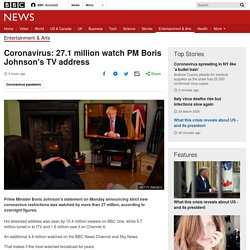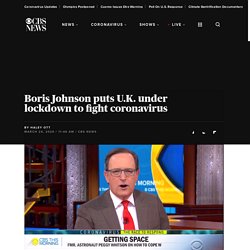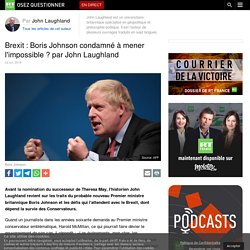

Coronavirus: 27.1 million watch PM Boris Johnson's TV address. Image copyright Getty Images Prime Minister Boris Johnson's statement on Monday announcing strict new coronavirus restrictions was watched by more than 27 million, according to overnight figures.

His televised address was seen by 15.4 million viewers on BBC One, while 5.7 million tuned in to ITV and 1.6 million saw it on Channel 4. An additional 4.4 million watched on the BBC News Channel and Sky News. That makes it the most watched broadcast for years. Media playback is unsupported on your device The Channel 4 and ITV ratings include +1 figures. The previous most-watched broadcast in recent years was the London Olympics Closing Ceremony in 2012, viewed by 24.5 million.
People in the UK are now living under strict new measures following the PM's announcement. U.K. coronavirus lockdown: Boris Johnson says Britons "must stay at home" London — The United Kingdom woke up Tuesday to a country-wide lockdown.

British Prime Minister Boris Johnson announced strict new measures Monday night to close all but "essential" businesses and keep people largely confined to their homes. The move came after weeks of criticism that the government wasn't doing enough to fight the U.K.'s coronavirus outbreak. "From this evening I must give the British people a very simple instruction: You must stay at home," Johnson said in a pre-recorded address delivered straight to camera. The only reason people are permitted to leave their homes now is to get essential supplies and exercise — but they've been urged to use food delivery services, and are permitted only one workout per day outside their homes, either alone or with other members of the same household.
"At present there are just no easy options," Johnson said. The police have the power to fine people for violating the rules and to disperse gatherings of more than two people. Boris Johnson takes a strong stand on covid-19 — and parts ways with Trump. Boris Johnson bans gatherings in the U.K. Boris Johnson #StayHomeSaveLives (@BorisJohnson) / Twitter. Brexit : Boris Johnson condamné à mener l'impossible ? par John Laughland.
Avant la nomination du successeur de Theresa May, l'historien John Laughland revient sur les traits du probable nouveau Premier ministre britannique Boris Johnson et les défis qui l'attendent avec le Brexit, dont dépend la survie des Conservateurs.

Quand un journaliste dans les années soixante demanda au Premier ministre conservateur emblématique, Harold McMillan, ce qui pourrait faire dévier le gouvernement de son cap, il répondit : «Les événements, mon cher, les événements.» S’il en est ainsi de tous les gouvernements, celui qui sera annoncé cette semaine à Londres sous la présidence de Boris Johnson sera vulnérable non seulement aux événements futurs, par définition imprévisibles, mais aussi de par le lourd héritage du mandat catastrophique de son prédécesseur. Biographe de Churchill, Boris Johnson sait combien les qualités d’homme d’Etat sont essentielles dans ces conditions d’extrême fragilité politique. Si le Parti conservateur n’acte pas le Brexit, il sera détruit électoralement.
Boris Johnson’s Brexit Backstop Face-Off Risks Everything For Nothing — Queen's University Belfast. Take back control of your news feed. Brexit: All you need to know about the UK leaving the EU. Under the terms of the deal, that won't change on 1 January, but to be sure that neither side has an unfair advantage, both sides had to agree to some shared rules and standards on workers' rights, as well as many social and environmental regulations.
You can read more detail on other aspects of the deal, including more on travel, fishing, and financial services, here. Under the terms of the deal, that won't change on 1 January, but to be sure that neither side has an unfair advantage, both sides had to agree to some shared rules and standards on workers' rights, as well as many social and environmental regulations. You can read more detail on other aspects of the deal, including more on travel, fishing, and financial services, here. Under the terms of the deal, that won't change on 1 January, but to be sure that neither side has an unfair advantage, both sides had to agree to some shared rules and standards on workers' rights, as well as many social and environmental regulations.